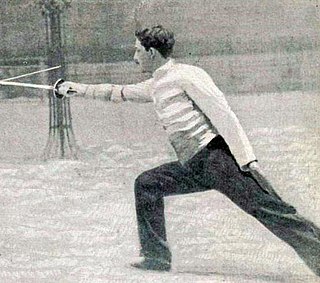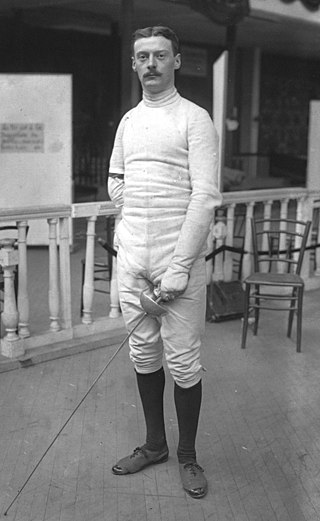Background
This was the second appearance of the event, which was not held at the first Games in 1896 (with only foil and sabre events held) but has been held at every Summer Olympics since 1900. [3]
Ramón Fonst of Cuba, the gold medalist in 1900, returned. Albertson Van Zo Post had been the United States champion in 1896. Charles Tatham was the United States champion in 1901, 1902, and 1903. The 1904 American champion, Charles Bothner, did not compete. [3]
Germany made its debut in the event. Cuba and the United States each appeared for the second time, the only two nations to have competed at both épée appearances to date.

At the 1900 Summer Olympics, seven fencing events were contested. 260 fencers from 19 nations competed. The events took place at the Tuileries Garden.

Cuba first participated at the Olympic Games in 1900, and has sent athletes to compete in 22 out of 29 Summer Olympic Games overall, up to and including the 2024 Paris Olympics.

Ramón Fonst Segundo was a Cuban fencer who competed in the early 20th century. He was one of the greatest world fencers, individual and by team; he was born and died in Havana.

The men's foil was a fencing event held as part of the fencing programme at the 1904 Summer Olympics. It was the third time the event was held at the Olympics. The competition was held on September 7, 1904. Nine fencers from three nations competed. The medals were swept by "Cuban" fencers; only Fonst was actually Cuban, but the other two men were marked as Cuban by the IOC despite being American. The mistake was corrected after more than 100 years in the early 2020s.

The men's sabre was a fencing event held as part of the fencing programme at the 1904 Summer Olympics. It was the third time the event was held at the Olympics. 5 fencers from 2 nations competed. The competition was held on Thursday, September 8, 1904. The event was won by Manuel Díaz of Cuba. American William Grebe took second. Albertson Van Zo Post, an American erroneously listed the IOC database as Cuban until 2021, earned bronze.
The men's singlestick was an event held as part of the fencing programme at the 1904 Summer Olympics. It was the only time the event was held at the Olympics. Three fencers competed. The competition was held on Thursday, September 8, 1904. Van Zo Post was credited as Cuban in the IOC's database despite the fact that he was an American, this was corrected in 2021.

The men's foil was a fencing event held as part of the Fencing at the 1912 Summer Olympics programme. It was the fourth appearance of the event, which had not been contested in 1908. There were 94 competitors from 15 nations, a large increase from the 9 fencers who had competed in 1904. The event was won by Nedo Nadi of Italy, the first of his two victories in the event. His countryman Pietro Speciale took silver, while Richard Verderber of Austria took bronze.

The men's épée was a fencing event held as part of the Fencing at the 1912 Summer Olympics programme. It was the fourth appearance of the event, which had been introduced in 1900. The competition was held from 11 to 13 July at the Östermalm Athletic Grounds. There were 93 competitors from 15 nations. Each nation could enter up to 12 fencers. The event was won by Paul Anspach of Belgium. His countryman Philippe le Hardy took bronze. Silver went to Denmark's Ivan Joseph Martin Osiier, the only medal won by the perennial Olympian who competed in seven Games over 40 years. The medals were the first in the men's épée for both nations.

The men's épée was a competition in fencing at the 2004 Summer Olympics in Athens. A total of 37 men from 21 nations competed in this event. Each nation was limited to 3 fencers. Competition took place in the Fencing Hall at the Helliniko Olympic Complex on August 17. The event was won by Marcel Fischer of Switzerland, the nation's first victory in the event and first medal of any color since 1952. Wang Lei's silver was China's first medal in the men's individual épée. Defending champion Pavel Kolobkov earned bronze, finishing a set of three different-colored Olympic medals in the event. Kolobkov was the fourth man to earn three medals in the event and had the best record of any of the four; only Ramón Fonst had more individual Olympic success in the men's épée. It was the fifth consecutive Games in which a Russian fencer reached the podium, including medals for Russian fencers competing for the Soviet Union (1988) and Unified Team (1992).

The épée event for amateurs was one of three épée events at the 1900 Summer Olympics. 102 fencers from 11 nations competed, with 91 of them from France. The event was won by Ramón Fonst of Cuba, the first of his two golds in individual épée. Silver and bronze both went to host nation fencers, Louis Perrée and Léon Sée. These badly organized games — derisively called “The Farcical Games” — were so poorly publicized that years later, even the competitors were clueless that they had competed in the Olympics in 1900. No official records for the games exist. These accomplishments are not even mentioned in the 1911 Encyclopædia Britannica. This was the first appearance of the event, as only foil and sabre events had been held at the first Games in 1896; the Men's épée event has been held at every Summer Olympics since 1900.

The amateurs-masters épée was an event at the 1900 Summer Olympics. It was held on 15 June at the Tuileries Garden. There were 8 competitors from two nations. The event was won by Albert Ayat of France. Ramón Fonst of Cuba took silver, while Léon Sée of France earned bronze.

Albertson Van Zo Post was an American fencer and writer. He earned two gold medals in the 1904 Summer Olympics as well as a silver and two bronze medals, and also competed in the 1912 Summer Olympics.

Charles T. Tatham was an American fencer who competed in the 1904 Summer Olympics. He was born and died in New York City and worked for his father's lead manufacturing company in Philadelphia. In 1891, Tatham was one of the founders of the AFLA/USFA.
The men's épée was one of seven fencing events on the Fencing at the 1924 Summer Olympics programme. It was the sixth appearance of the event, which had not been on the programme in 1896. The competition was held from Wednesday, July 10, 1924 to Thursday, July 11, 1924. 67 fencers from 18 nations competed. Nations were limited to four competitors each. The event was won by Charles Delporte of Belgium, the nation's second victory in the individual épée. Silver went to Roger Ducret of France. Nils Hellsten earned Sweden's first medal in the event with his bronze.

The men's épée was one of seven fencing events on the Fencing at the 1928 Summer Olympics programme. It was the seventh appearance of the event. The competition was held from 6 August 1928 to 7 August 1928. 59 fencers from 22 nations competed. Each nation could have up to three fencers. The event was won by Lucien Gaudin of France, the nation's third victory in the individual men's épée—taking sole possession of most among nations above Cuba and Belgium, each at two. Gaudin was the second man to win both the foil and épée events at a single Games. It was the third consecutive Games at which France reached the podium in the event. Two Frenchman had reached the head-to-head final; Gaudin won over Georges Buchard, who received silver. Bronze in 1928 went to American George Calnan, the nation's first medal in the event.

The men's épée was one of seven fencing events on the fencing at the 1936 Summer Olympics programme. It was the ninth appearance of the event. The competition was held from 9 August 1936 to 11 August 1936. 68 fencers from 26 nations competed. Nations were limited to three fencers. The event was won by Franco Riccardi of Italy, the nation's second consecutive victory in the men's épée. Riccardi's teammates Saverio Ragno and Giancarlo Cornaggia-Medici took silver and bronze, respectively, to give Italy a medal sweep—Italy's first and the fourth overall in the event. Cornaggia-Medici, who had won gold in 1932, became the fourth man to win multiple medals in the individual épée. For the first time, France competed in the event but did not win any medals.

The men's épée was one of seven fencing events on the fencing at the 1956 Summer Olympics programme. It was the twelfth appearance of the event. The competition was held on 30 November 1956. 41 fencers from 18 nations competed. Nations were limited to three fencers each. The event was won by Carlo Pavesi of Italy, the nation's fifth consecutive victory in the men's épée. In all five of those Games, Italy earned at least two medals in the event; this was the second sweep during that period for Italy. Giuseppe Delfino was the silver medalist while Edoardo Mangiarotti took bronze. It was Mangiarotti's third medal in the event, along with gold in 1952 and another bronze in 1948; he was the first man to win three medals in the individual épée.

The men's épée was one of ten fencing events on the fencing at the 2000 Summer Olympics programme. It was the twenty-third appearance of the event. The competition was held on 16 September 2000. 42 fencers from 22 nations competed. Each nation was limited to three fencers. The event was won by Pavel Kolobkov of Russia, the nation's second consecutive victory in the men's individual épée. Russia joined a five-way tie for third-most gold medals in the event at two. Kolobkov, who had a silver medal in 1992 representing the Unified Team, was the 11th man to win multiple medals in the event. France's Hugues Obry took silver in Sydney, returning France to the podium after a one-Games absence snapped a four-Games medal streak. Lee Sang-ki earned South Korea's first medal in the event with his bronze.

The men's épée was one of ten fencing events on the fencing at the 1996 Summer Olympics programme. It was the twenty-second appearance of the event. The competition was held on 20 July 1996. 45 fencers from 21 nations competed, a sharply reduced number from prior Games which generally had 60 to 80 fencers. Each nation remained limited to 3 fencers in the event. The event was won by Aleksandr Beketov of Russia, the nation's first victory and first medal in the event in its debut. Iván Trevejo's silver was Cuba's first medal in the event since Ramón Fonst won the first two gold medals in 1900 and 1904. The bronze went to Géza Imre of Hungary, that nation's first medal in the men's individual épée since 1980. France's four-Games podium streak ended.

The men's épée competition in fencing at the 2012 Summer Olympics in London was held on 1 August at the ExCeL London Exhibition Centre. There were 30 competitors from 24 nations. Rubén Limardo of Venezuela won the gold medal – the country's only medal of the 2012 Games as well as the country's first medal in men's individual épée. Norway's Bartosz Piasecki won silver and Jung Jin-Sun from South Korea took bronze.
















